Leeth v Commonwealth: Constitutional Law and Criminal Justice
VerifiedAdded on 2020/09/28
|7
|2859
|270
Case Study
AI Summary
The provided document is a detailed analysis of the High Court case of Leeth v. Commonwealth. The case involves an American citizen, P, who pleaded guilty to several offenses under the Customs Act 1901 (Cth) in Queensland, including conspiring to import cannabis resin. The primary legal issues revolve around the validity of the Commonwealth Prisoners Act, particularly section 4(1), which addressed non-parole periods for federal offenders, and its impact on the sentencing process in light of differing state laws. The arguments for the plaintiff centered on the claim that the Commonwealth law resulted in unequal treatment of offenders due to state law variations, potentially violating the Constitution. The court considered the interplay of federal and state laws, the role of judicial power, and the principle of equality under the law. The court explored the implications of the Commonwealth's use of state parole systems, the integration of sentencing and punishment, and the role of the states in the administration of federal criminal law. The case also addressed the application of sentencing and remissions, and the principle of uniformity. The court ultimately found that the Commonwealth law was valid, emphasizing that the Constitution allows for the administration of criminal law on a state-by-state basis, acknowledging differences in state laws. Brennan's view on the impact of locality on the penalty was also discussed. The ruling highlights the balance between federal and state powers in the Australian legal system, particularly in the context of criminal justice.
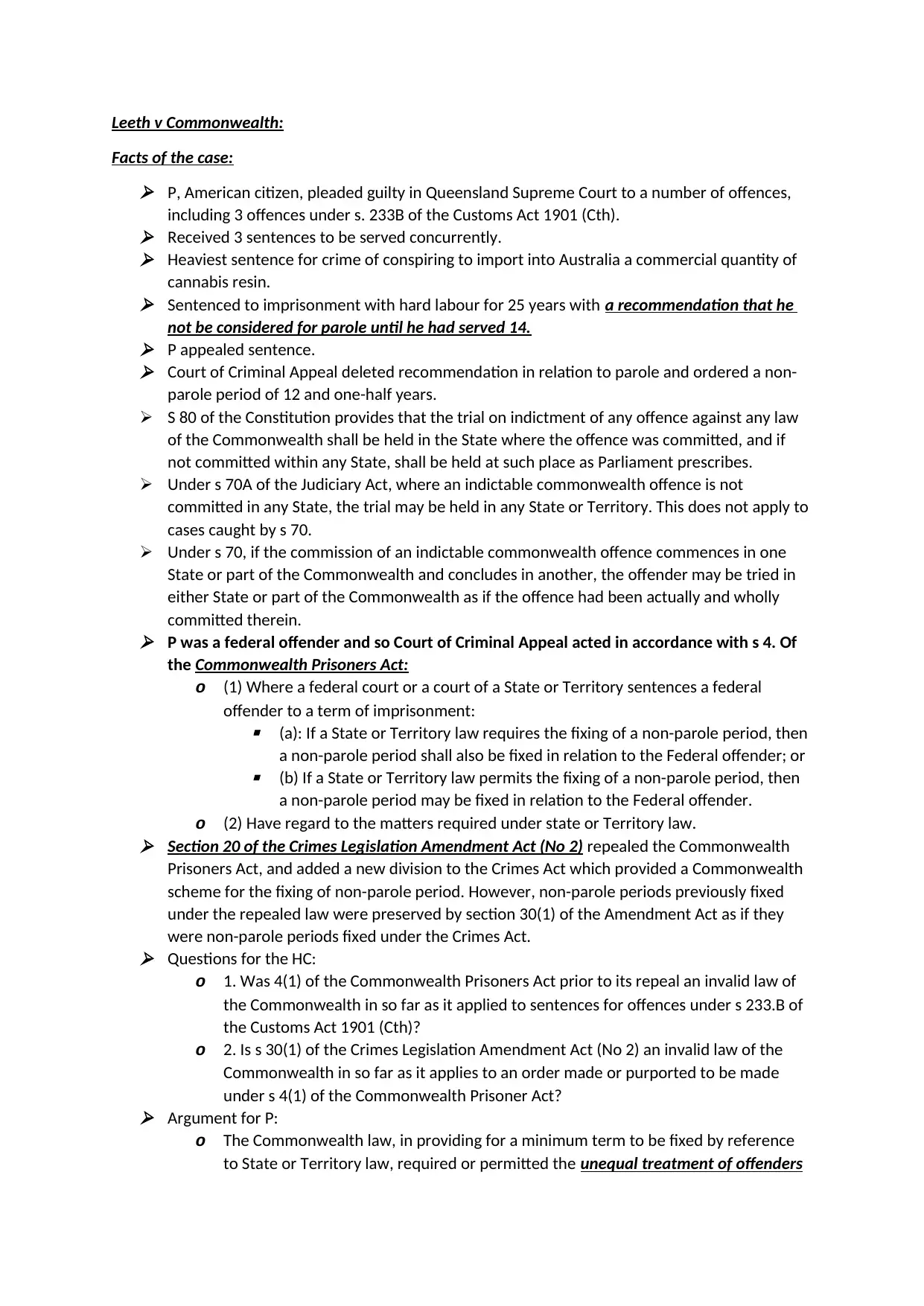
Leeth v Commonwealth:
Facts of the case: P, American citizen, pleaded guilty in Queensland Supreme Court to a number of offences,
including 3 offences under s. 233B of the Customs Act 1901 (Cth).
Received 3 sentences to be served concurrently.
Heaviest sentence for crime of conspiring to import into Australia a commercial quantity of
cannabis resin.
Sentenced to imprisonment with hard labour for 25 years with a recommendation that he
not be considered for parole until he had served 14.
P appealed sentence.
Court of Criminal Appeal deleted recommendation in relation to parole and ordered a non-
parole period of 12 and one-half years.
S 80 of the Constitution provides that the trial on indictment of any offence against any law
of the Commonwealth shall be held in the State where the offence was committed, and if
not committed within any State, shall be held at such place as Parliament prescribes.
Under s 70A of the Judiciary Act, where an indictable commonwealth offence is not
committed in any State, the trial may be held in any State or Territory. This does not apply to
cases caught by s 70.
Under s 70, if the commission of an indictable commonwealth offence commences in one
State or part of the Commonwealth and concludes in another, the offender may be tried in
either State or part of the Commonwealth as if the offence had been actually and wholly
committed therein.
P was a federal offender and so Court of Criminal Appeal acted in accordance with s 4. Of
the Commonwealth Prisoners Act:
o (1) Where a federal court or a court of a State or Territory sentences a federal
offender to a term of imprisonment:
(a): If a State or Territory law requires the fixing of a non-parole period, then
a non-parole period shall also be fixed in relation to the Federal offender; or
(b) If a State or Territory law permits the fixing of a non-parole period, then
a non-parole period may be fixed in relation to the Federal offender.
o (2) Have regard to the matters required under state or Territory law.
Section 20 of the Crimes Legislation Amendment Act (No 2) repealed the Commonwealth
Prisoners Act, and added a new division to the Crimes Act which provided a Commonwealth
scheme for the fixing of non-parole period. However, non-parole periods previously fixed
under the repealed law were preserved by section 30(1) of the Amendment Act as if they
were non-parole periods fixed under the Crimes Act.
Questions for the HC:
o 1. Was 4(1) of the Commonwealth Prisoners Act prior to its repeal an invalid law of
the Commonwealth in so far as it applied to sentences for offences under s 233.B of
the Customs Act 1901 (Cth)?
o 2. Is s 30(1) of the Crimes Legislation Amendment Act (No 2) an invalid law of the
Commonwealth in so far as it applies to an order made or purported to be made
under s 4(1) of the Commonwealth Prisoner Act?
Argument for P:
o The Commonwealth law, in providing for a minimum term to be fixed by reference
to State or Territory law, required or permitted the unequal treatment of offenders
Facts of the case: P, American citizen, pleaded guilty in Queensland Supreme Court to a number of offences,
including 3 offences under s. 233B of the Customs Act 1901 (Cth).
Received 3 sentences to be served concurrently.
Heaviest sentence for crime of conspiring to import into Australia a commercial quantity of
cannabis resin.
Sentenced to imprisonment with hard labour for 25 years with a recommendation that he
not be considered for parole until he had served 14.
P appealed sentence.
Court of Criminal Appeal deleted recommendation in relation to parole and ordered a non-
parole period of 12 and one-half years.
S 80 of the Constitution provides that the trial on indictment of any offence against any law
of the Commonwealth shall be held in the State where the offence was committed, and if
not committed within any State, shall be held at such place as Parliament prescribes.
Under s 70A of the Judiciary Act, where an indictable commonwealth offence is not
committed in any State, the trial may be held in any State or Territory. This does not apply to
cases caught by s 70.
Under s 70, if the commission of an indictable commonwealth offence commences in one
State or part of the Commonwealth and concludes in another, the offender may be tried in
either State or part of the Commonwealth as if the offence had been actually and wholly
committed therein.
P was a federal offender and so Court of Criminal Appeal acted in accordance with s 4. Of
the Commonwealth Prisoners Act:
o (1) Where a federal court or a court of a State or Territory sentences a federal
offender to a term of imprisonment:
(a): If a State or Territory law requires the fixing of a non-parole period, then
a non-parole period shall also be fixed in relation to the Federal offender; or
(b) If a State or Territory law permits the fixing of a non-parole period, then
a non-parole period may be fixed in relation to the Federal offender.
o (2) Have regard to the matters required under state or Territory law.
Section 20 of the Crimes Legislation Amendment Act (No 2) repealed the Commonwealth
Prisoners Act, and added a new division to the Crimes Act which provided a Commonwealth
scheme for the fixing of non-parole period. However, non-parole periods previously fixed
under the repealed law were preserved by section 30(1) of the Amendment Act as if they
were non-parole periods fixed under the Crimes Act.
Questions for the HC:
o 1. Was 4(1) of the Commonwealth Prisoners Act prior to its repeal an invalid law of
the Commonwealth in so far as it applied to sentences for offences under s 233.B of
the Customs Act 1901 (Cth)?
o 2. Is s 30(1) of the Crimes Legislation Amendment Act (No 2) an invalid law of the
Commonwealth in so far as it applies to an order made or purported to be made
under s 4(1) of the Commonwealth Prisoner Act?
Argument for P:
o The Commonwealth law, in providing for a minimum term to be fixed by reference
to State or Territory law, required or permitted the unequal treatment of offenders
Paraphrase This Document
Need a fresh take? Get an instant paraphrase of this document with our AI Paraphraser
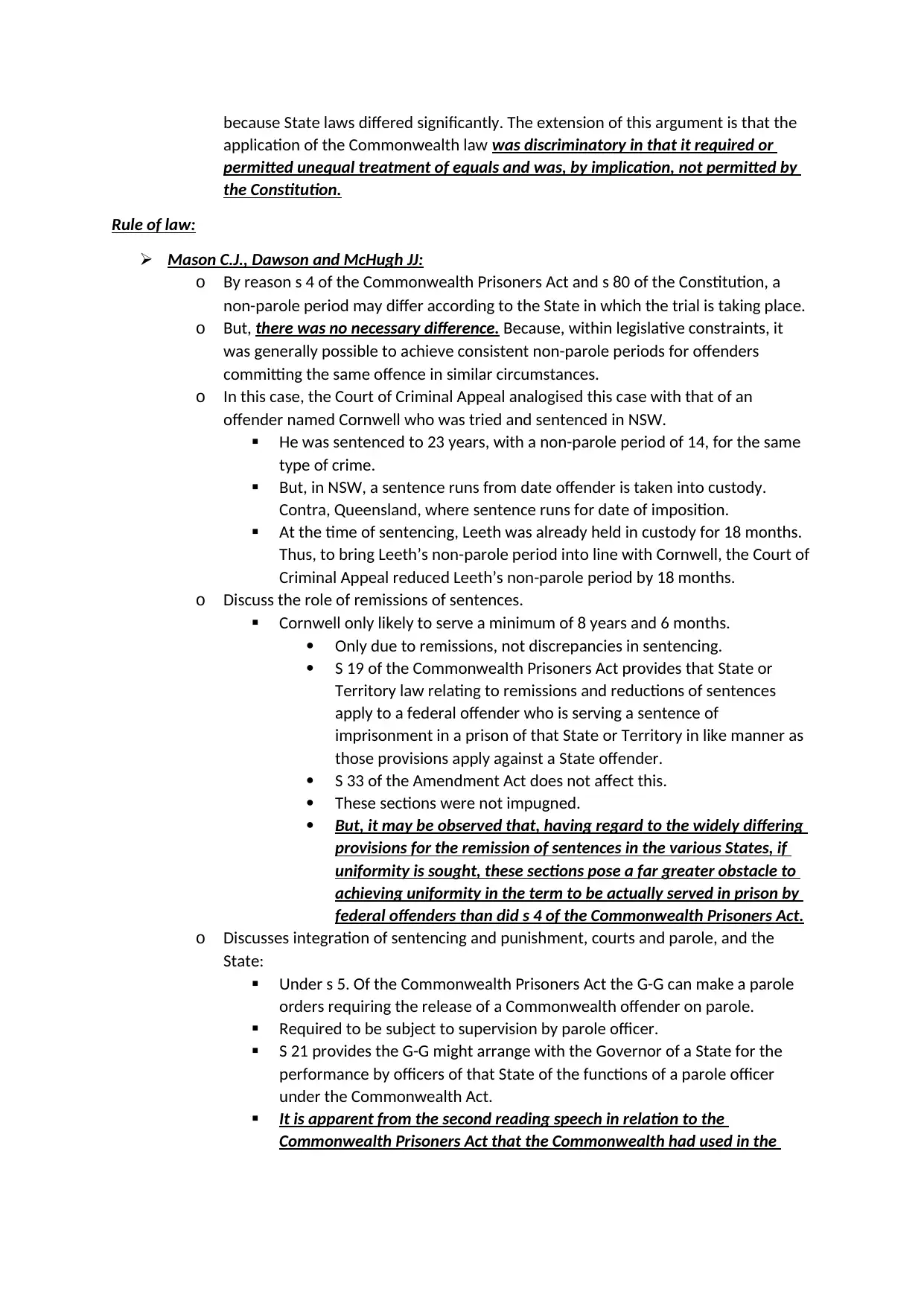
because State laws differed significantly. The extension of this argument is that the
application of the Commonwealth law was discriminatory in that it required or
permitted unequal treatment of equals and was, by implication, not permitted by
the Constitution.
Rule of law:
Mason C.J., Dawson and McHugh JJ:
o By reason s 4 of the Commonwealth Prisoners Act and s 80 of the Constitution, a
non-parole period may differ according to the State in which the trial is taking place.
o But, there was no necessary difference. Because, within legislative constraints, it
was generally possible to achieve consistent non-parole periods for offenders
committing the same offence in similar circumstances.
o In this case, the Court of Criminal Appeal analogised this case with that of an
offender named Cornwell who was tried and sentenced in NSW.
He was sentenced to 23 years, with a non-parole period of 14, for the same
type of crime.
But, in NSW, a sentence runs from date offender is taken into custody.
Contra, Queensland, where sentence runs for date of imposition.
At the time of sentencing, Leeth was already held in custody for 18 months.
Thus, to bring Leeth’s non-parole period into line with Cornwell, the Court of
Criminal Appeal reduced Leeth’s non-parole period by 18 months.
o Discuss the role of remissions of sentences.
Cornwell only likely to serve a minimum of 8 years and 6 months.
Only due to remissions, not discrepancies in sentencing.
S 19 of the Commonwealth Prisoners Act provides that State or
Territory law relating to remissions and reductions of sentences
apply to a federal offender who is serving a sentence of
imprisonment in a prison of that State or Territory in like manner as
those provisions apply against a State offender.
S 33 of the Amendment Act does not affect this.
These sections were not impugned.
But, it may be observed that, having regard to the widely differing
provisions for the remission of sentences in the various States, if
uniformity is sought, these sections pose a far greater obstacle to
achieving uniformity in the term to be actually served in prison by
federal offenders than did s 4 of the Commonwealth Prisoners Act.
o Discusses integration of sentencing and punishment, courts and parole, and the
State:
Under s 5. Of the Commonwealth Prisoners Act the G-G can make a parole
orders requiring the release of a Commonwealth offender on parole.
Required to be subject to supervision by parole officer.
S 21 provides the G-G might arrange with the Governor of a State for the
performance by officers of that State of the functions of a parole officer
under the Commonwealth Act.
It is apparent from the second reading speech in relation to the
Commonwealth Prisoners Act that the Commonwealth had used in the
application of the Commonwealth law was discriminatory in that it required or
permitted unequal treatment of equals and was, by implication, not permitted by
the Constitution.
Rule of law:
Mason C.J., Dawson and McHugh JJ:
o By reason s 4 of the Commonwealth Prisoners Act and s 80 of the Constitution, a
non-parole period may differ according to the State in which the trial is taking place.
o But, there was no necessary difference. Because, within legislative constraints, it
was generally possible to achieve consistent non-parole periods for offenders
committing the same offence in similar circumstances.
o In this case, the Court of Criminal Appeal analogised this case with that of an
offender named Cornwell who was tried and sentenced in NSW.
He was sentenced to 23 years, with a non-parole period of 14, for the same
type of crime.
But, in NSW, a sentence runs from date offender is taken into custody.
Contra, Queensland, where sentence runs for date of imposition.
At the time of sentencing, Leeth was already held in custody for 18 months.
Thus, to bring Leeth’s non-parole period into line with Cornwell, the Court of
Criminal Appeal reduced Leeth’s non-parole period by 18 months.
o Discuss the role of remissions of sentences.
Cornwell only likely to serve a minimum of 8 years and 6 months.
Only due to remissions, not discrepancies in sentencing.
S 19 of the Commonwealth Prisoners Act provides that State or
Territory law relating to remissions and reductions of sentences
apply to a federal offender who is serving a sentence of
imprisonment in a prison of that State or Territory in like manner as
those provisions apply against a State offender.
S 33 of the Amendment Act does not affect this.
These sections were not impugned.
But, it may be observed that, having regard to the widely differing
provisions for the remission of sentences in the various States, if
uniformity is sought, these sections pose a far greater obstacle to
achieving uniformity in the term to be actually served in prison by
federal offenders than did s 4 of the Commonwealth Prisoners Act.
o Discusses integration of sentencing and punishment, courts and parole, and the
State:
Under s 5. Of the Commonwealth Prisoners Act the G-G can make a parole
orders requiring the release of a Commonwealth offender on parole.
Required to be subject to supervision by parole officer.
S 21 provides the G-G might arrange with the Governor of a State for the
performance by officers of that State of the functions of a parole officer
under the Commonwealth Act.
It is apparent from the second reading speech in relation to the
Commonwealth Prisoners Act that the Commonwealth had used in the
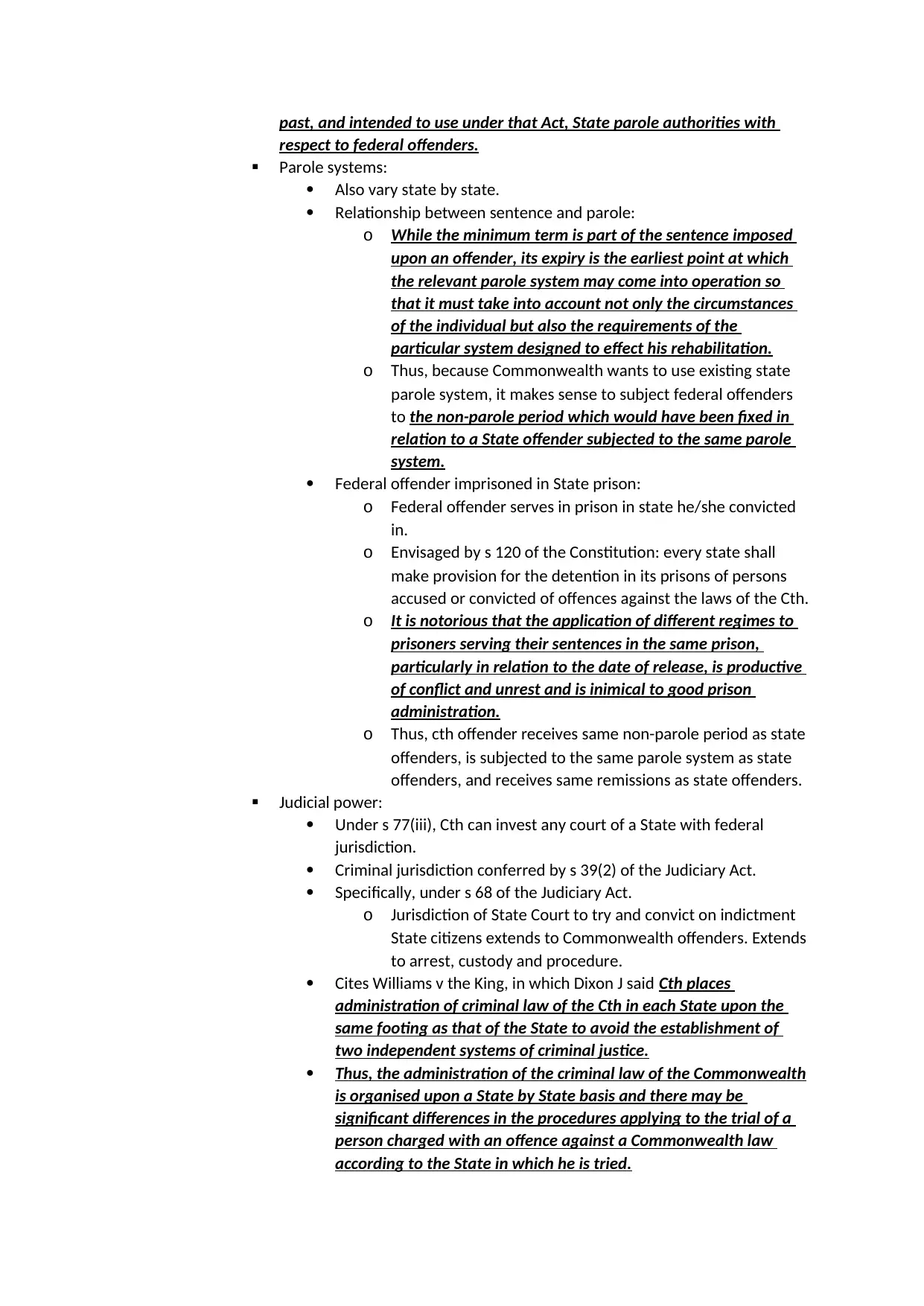
past, and intended to use under that Act, State parole authorities with
respect to federal offenders.
Parole systems:
Also vary state by state.
Relationship between sentence and parole:
o While the minimum term is part of the sentence imposed
upon an offender, its expiry is the earliest point at which
the relevant parole system may come into operation so
that it must take into account not only the circumstances
of the individual but also the requirements of the
particular system designed to effect his rehabilitation.
o Thus, because Commonwealth wants to use existing state
parole system, it makes sense to subject federal offenders
to the non-parole period which would have been fixed in
relation to a State offender subjected to the same parole
system.
Federal offender imprisoned in State prison:
o Federal offender serves in prison in state he/she convicted
in.
o Envisaged by s 120 of the Constitution: every state shall
make provision for the detention in its prisons of persons
accused or convicted of offences against the laws of the Cth.
o It is notorious that the application of different regimes to
prisoners serving their sentences in the same prison,
particularly in relation to the date of release, is productive
of conflict and unrest and is inimical to good prison
administration.
o Thus, cth offender receives same non-parole period as state
offenders, is subjected to the same parole system as state
offenders, and receives same remissions as state offenders.
Judicial power:
Under s 77(iii), Cth can invest any court of a State with federal
jurisdiction.
Criminal jurisdiction conferred by s 39(2) of the Judiciary Act.
Specifically, under s 68 of the Judiciary Act.
o Jurisdiction of State Court to try and convict on indictment
State citizens extends to Commonwealth offenders. Extends
to arrest, custody and procedure.
Cites Williams v the King, in which Dixon J said Cth places
administration of criminal law of the Cth in each State upon the
same footing as that of the State to avoid the establishment of
two independent systems of criminal justice.
Thus, the administration of the criminal law of the Commonwealth
is organised upon a State by State basis and there may be
significant differences in the procedures applying to the trial of a
person charged with an offence against a Commonwealth law
according to the State in which he is tried.
respect to federal offenders.
Parole systems:
Also vary state by state.
Relationship between sentence and parole:
o While the minimum term is part of the sentence imposed
upon an offender, its expiry is the earliest point at which
the relevant parole system may come into operation so
that it must take into account not only the circumstances
of the individual but also the requirements of the
particular system designed to effect his rehabilitation.
o Thus, because Commonwealth wants to use existing state
parole system, it makes sense to subject federal offenders
to the non-parole period which would have been fixed in
relation to a State offender subjected to the same parole
system.
Federal offender imprisoned in State prison:
o Federal offender serves in prison in state he/she convicted
in.
o Envisaged by s 120 of the Constitution: every state shall
make provision for the detention in its prisons of persons
accused or convicted of offences against the laws of the Cth.
o It is notorious that the application of different regimes to
prisoners serving their sentences in the same prison,
particularly in relation to the date of release, is productive
of conflict and unrest and is inimical to good prison
administration.
o Thus, cth offender receives same non-parole period as state
offenders, is subjected to the same parole system as state
offenders, and receives same remissions as state offenders.
Judicial power:
Under s 77(iii), Cth can invest any court of a State with federal
jurisdiction.
Criminal jurisdiction conferred by s 39(2) of the Judiciary Act.
Specifically, under s 68 of the Judiciary Act.
o Jurisdiction of State Court to try and convict on indictment
State citizens extends to Commonwealth offenders. Extends
to arrest, custody and procedure.
Cites Williams v the King, in which Dixon J said Cth places
administration of criminal law of the Cth in each State upon the
same footing as that of the State to avoid the establishment of
two independent systems of criminal justice.
Thus, the administration of the criminal law of the Commonwealth
is organised upon a State by State basis and there may be
significant differences in the procedures applying to the trial of a
person charged with an offence against a Commonwealth law
according to the State in which he is tried.
⊘ This is a preview!⊘
Do you want full access?
Subscribe today to unlock all pages.

Trusted by 1+ million students worldwide
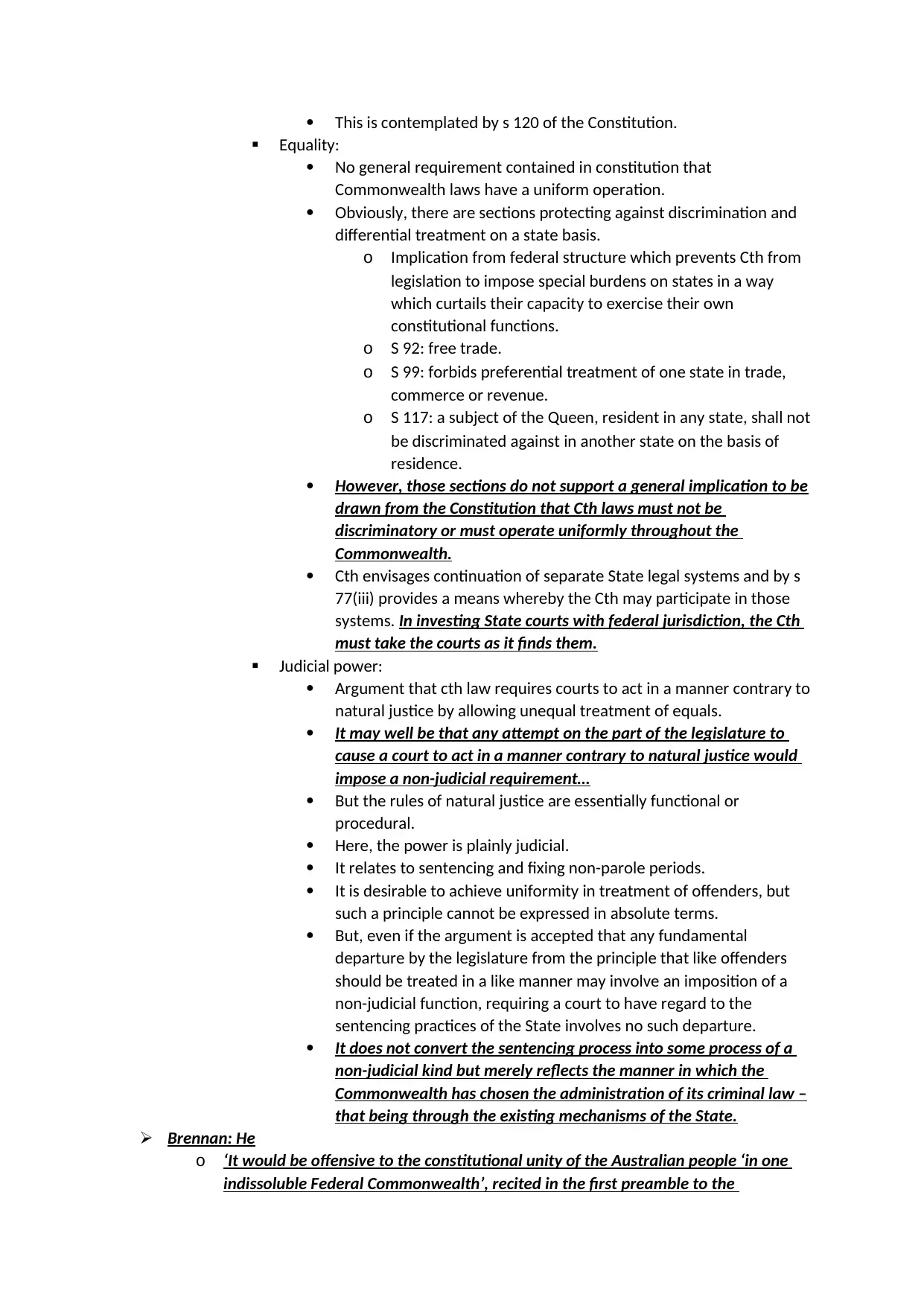
This is contemplated by s 120 of the Constitution.
Equality:
No general requirement contained in constitution that
Commonwealth laws have a uniform operation.
Obviously, there are sections protecting against discrimination and
differential treatment on a state basis.
o Implication from federal structure which prevents Cth from
legislation to impose special burdens on states in a way
which curtails their capacity to exercise their own
constitutional functions.
o S 92: free trade.
o S 99: forbids preferential treatment of one state in trade,
commerce or revenue.
o S 117: a subject of the Queen, resident in any state, shall not
be discriminated against in another state on the basis of
residence.
However, those sections do not support a general implication to be
drawn from the Constitution that Cth laws must not be
discriminatory or must operate uniformly throughout the
Commonwealth.
Cth envisages continuation of separate State legal systems and by s
77(iii) provides a means whereby the Cth may participate in those
systems. In investing State courts with federal jurisdiction, the Cth
must take the courts as it finds them.
Judicial power:
Argument that cth law requires courts to act in a manner contrary to
natural justice by allowing unequal treatment of equals.
It may well be that any attempt on the part of the legislature to
cause a court to act in a manner contrary to natural justice would
impose a non-judicial requirement…
But the rules of natural justice are essentially functional or
procedural.
Here, the power is plainly judicial.
It relates to sentencing and fixing non-parole periods.
It is desirable to achieve uniformity in treatment of offenders, but
such a principle cannot be expressed in absolute terms.
But, even if the argument is accepted that any fundamental
departure by the legislature from the principle that like offenders
should be treated in a like manner may involve an imposition of a
non-judicial function, requiring a court to have regard to the
sentencing practices of the State involves no such departure.
It does not convert the sentencing process into some process of a
non-judicial kind but merely reflects the manner in which the
Commonwealth has chosen the administration of its criminal law –
that being through the existing mechanisms of the State.
Brennan: He
o ‘It would be offensive to the constitutional unity of the Australian people ‘in one
indissoluble Federal Commonwealth’, recited in the first preamble to the
Equality:
No general requirement contained in constitution that
Commonwealth laws have a uniform operation.
Obviously, there are sections protecting against discrimination and
differential treatment on a state basis.
o Implication from federal structure which prevents Cth from
legislation to impose special burdens on states in a way
which curtails their capacity to exercise their own
constitutional functions.
o S 92: free trade.
o S 99: forbids preferential treatment of one state in trade,
commerce or revenue.
o S 117: a subject of the Queen, resident in any state, shall not
be discriminated against in another state on the basis of
residence.
However, those sections do not support a general implication to be
drawn from the Constitution that Cth laws must not be
discriminatory or must operate uniformly throughout the
Commonwealth.
Cth envisages continuation of separate State legal systems and by s
77(iii) provides a means whereby the Cth may participate in those
systems. In investing State courts with federal jurisdiction, the Cth
must take the courts as it finds them.
Judicial power:
Argument that cth law requires courts to act in a manner contrary to
natural justice by allowing unequal treatment of equals.
It may well be that any attempt on the part of the legislature to
cause a court to act in a manner contrary to natural justice would
impose a non-judicial requirement…
But the rules of natural justice are essentially functional or
procedural.
Here, the power is plainly judicial.
It relates to sentencing and fixing non-parole periods.
It is desirable to achieve uniformity in treatment of offenders, but
such a principle cannot be expressed in absolute terms.
But, even if the argument is accepted that any fundamental
departure by the legislature from the principle that like offenders
should be treated in a like manner may involve an imposition of a
non-judicial function, requiring a court to have regard to the
sentencing practices of the State involves no such departure.
It does not convert the sentencing process into some process of a
non-judicial kind but merely reflects the manner in which the
Commonwealth has chosen the administration of its criminal law –
that being through the existing mechanisms of the State.
Brennan: He
o ‘It would be offensive to the constitutional unity of the Australian people ‘in one
indissoluble Federal Commonwealth’, recited in the first preamble to the
Paraphrase This Document
Need a fresh take? Get an instant paraphrase of this document with our AI Paraphraser
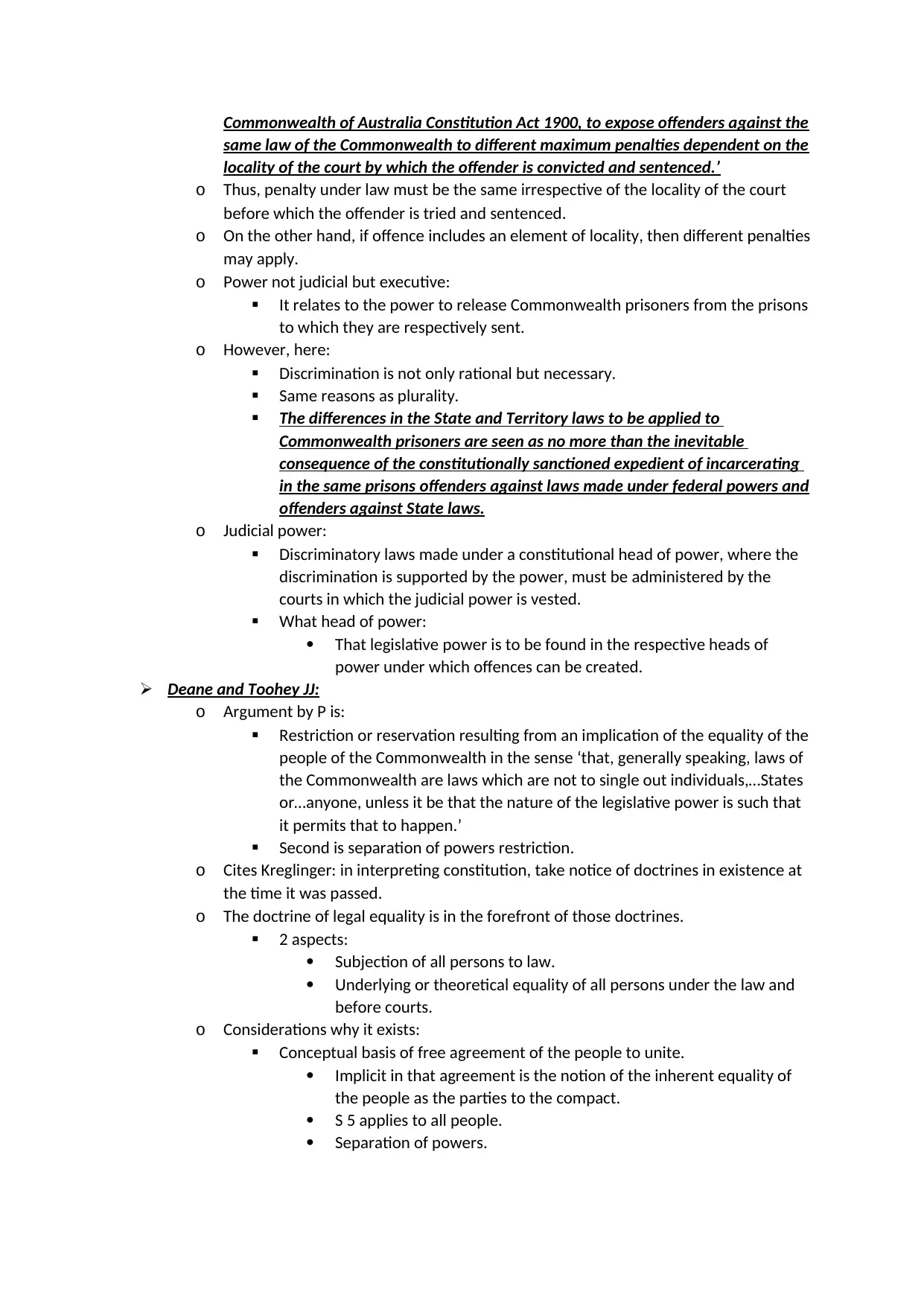
Commonwealth of Australia Constitution Act 1900, to expose offenders against the
same law of the Commonwealth to different maximum penalties dependent on the
locality of the court by which the offender is convicted and sentenced.’
o Thus, penalty under law must be the same irrespective of the locality of the court
before which the offender is tried and sentenced.
o On the other hand, if offence includes an element of locality, then different penalties
may apply.
o Power not judicial but executive:
It relates to the power to release Commonwealth prisoners from the prisons
to which they are respectively sent.
o However, here:
Discrimination is not only rational but necessary.
Same reasons as plurality.
The differences in the State and Territory laws to be applied to
Commonwealth prisoners are seen as no more than the inevitable
consequence of the constitutionally sanctioned expedient of incarcerating
in the same prisons offenders against laws made under federal powers and
offenders against State laws.
o Judicial power:
Discriminatory laws made under a constitutional head of power, where the
discrimination is supported by the power, must be administered by the
courts in which the judicial power is vested.
What head of power:
That legislative power is to be found in the respective heads of
power under which offences can be created.
Deane and Toohey JJ:
o Argument by P is:
Restriction or reservation resulting from an implication of the equality of the
people of the Commonwealth in the sense ‘that, generally speaking, laws of
the Commonwealth are laws which are not to single out individuals,…States
or…anyone, unless it be that the nature of the legislative power is such that
it permits that to happen.’
Second is separation of powers restriction.
o Cites Kreglinger: in interpreting constitution, take notice of doctrines in existence at
the time it was passed.
o The doctrine of legal equality is in the forefront of those doctrines.
2 aspects:
Subjection of all persons to law.
Underlying or theoretical equality of all persons under the law and
before courts.
o Considerations why it exists:
Conceptual basis of free agreement of the people to unite.
Implicit in that agreement is the notion of the inherent equality of
the people as the parties to the compact.
S 5 applies to all people.
Separation of powers.
same law of the Commonwealth to different maximum penalties dependent on the
locality of the court by which the offender is convicted and sentenced.’
o Thus, penalty under law must be the same irrespective of the locality of the court
before which the offender is tried and sentenced.
o On the other hand, if offence includes an element of locality, then different penalties
may apply.
o Power not judicial but executive:
It relates to the power to release Commonwealth prisoners from the prisons
to which they are respectively sent.
o However, here:
Discrimination is not only rational but necessary.
Same reasons as plurality.
The differences in the State and Territory laws to be applied to
Commonwealth prisoners are seen as no more than the inevitable
consequence of the constitutionally sanctioned expedient of incarcerating
in the same prisons offenders against laws made under federal powers and
offenders against State laws.
o Judicial power:
Discriminatory laws made under a constitutional head of power, where the
discrimination is supported by the power, must be administered by the
courts in which the judicial power is vested.
What head of power:
That legislative power is to be found in the respective heads of
power under which offences can be created.
Deane and Toohey JJ:
o Argument by P is:
Restriction or reservation resulting from an implication of the equality of the
people of the Commonwealth in the sense ‘that, generally speaking, laws of
the Commonwealth are laws which are not to single out individuals,…States
or…anyone, unless it be that the nature of the legislative power is such that
it permits that to happen.’
Second is separation of powers restriction.
o Cites Kreglinger: in interpreting constitution, take notice of doctrines in existence at
the time it was passed.
o The doctrine of legal equality is in the forefront of those doctrines.
2 aspects:
Subjection of all persons to law.
Underlying or theoretical equality of all persons under the law and
before courts.
o Considerations why it exists:
Conceptual basis of free agreement of the people to unite.
Implicit in that agreement is the notion of the inherent equality of
the people as the parties to the compact.
S 5 applies to all people.
Separation of powers.
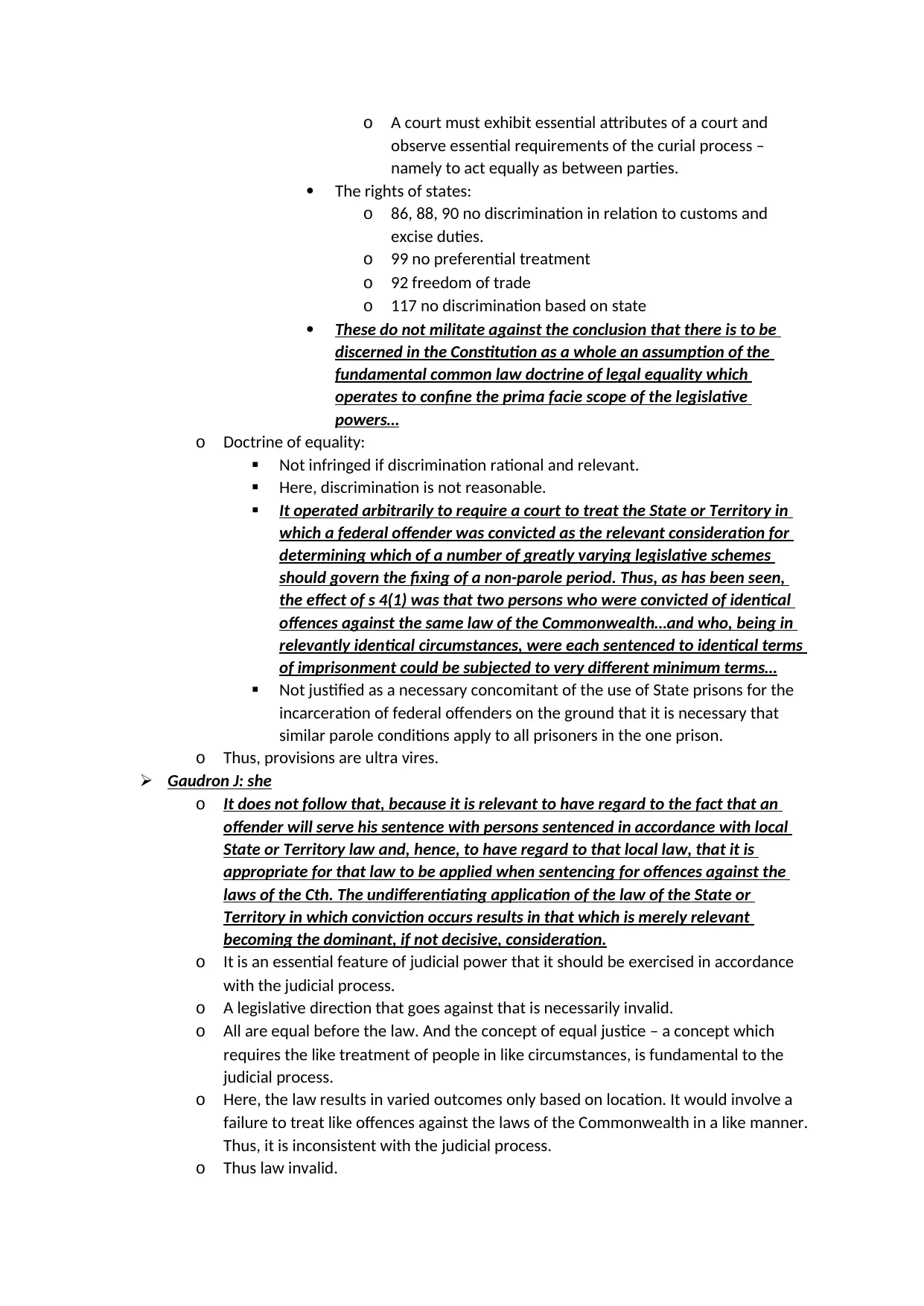
o A court must exhibit essential attributes of a court and
observe essential requirements of the curial process –
namely to act equally as between parties.
The rights of states:
o 86, 88, 90 no discrimination in relation to customs and
excise duties.
o 99 no preferential treatment
o 92 freedom of trade
o 117 no discrimination based on state
These do not militate against the conclusion that there is to be
discerned in the Constitution as a whole an assumption of the
fundamental common law doctrine of legal equality which
operates to confine the prima facie scope of the legislative
powers…
o Doctrine of equality:
Not infringed if discrimination rational and relevant.
Here, discrimination is not reasonable.
It operated arbitrarily to require a court to treat the State or Territory in
which a federal offender was convicted as the relevant consideration for
determining which of a number of greatly varying legislative schemes
should govern the fixing of a non-parole period. Thus, as has been seen,
the effect of s 4(1) was that two persons who were convicted of identical
offences against the same law of the Commonwealth…and who, being in
relevantly identical circumstances, were each sentenced to identical terms
of imprisonment could be subjected to very different minimum terms…
Not justified as a necessary concomitant of the use of State prisons for the
incarceration of federal offenders on the ground that it is necessary that
similar parole conditions apply to all prisoners in the one prison.
o Thus, provisions are ultra vires.
Gaudron J: she
o It does not follow that, because it is relevant to have regard to the fact that an
offender will serve his sentence with persons sentenced in accordance with local
State or Territory law and, hence, to have regard to that local law, that it is
appropriate for that law to be applied when sentencing for offences against the
laws of the Cth. The undifferentiating application of the law of the State or
Territory in which conviction occurs results in that which is merely relevant
becoming the dominant, if not decisive, consideration.
o It is an essential feature of judicial power that it should be exercised in accordance
with the judicial process.
o A legislative direction that goes against that is necessarily invalid.
o All are equal before the law. And the concept of equal justice – a concept which
requires the like treatment of people in like circumstances, is fundamental to the
judicial process.
o Here, the law results in varied outcomes only based on location. It would involve a
failure to treat like offences against the laws of the Commonwealth in a like manner.
Thus, it is inconsistent with the judicial process.
o Thus law invalid.
observe essential requirements of the curial process –
namely to act equally as between parties.
The rights of states:
o 86, 88, 90 no discrimination in relation to customs and
excise duties.
o 99 no preferential treatment
o 92 freedom of trade
o 117 no discrimination based on state
These do not militate against the conclusion that there is to be
discerned in the Constitution as a whole an assumption of the
fundamental common law doctrine of legal equality which
operates to confine the prima facie scope of the legislative
powers…
o Doctrine of equality:
Not infringed if discrimination rational and relevant.
Here, discrimination is not reasonable.
It operated arbitrarily to require a court to treat the State or Territory in
which a federal offender was convicted as the relevant consideration for
determining which of a number of greatly varying legislative schemes
should govern the fixing of a non-parole period. Thus, as has been seen,
the effect of s 4(1) was that two persons who were convicted of identical
offences against the same law of the Commonwealth…and who, being in
relevantly identical circumstances, were each sentenced to identical terms
of imprisonment could be subjected to very different minimum terms…
Not justified as a necessary concomitant of the use of State prisons for the
incarceration of federal offenders on the ground that it is necessary that
similar parole conditions apply to all prisoners in the one prison.
o Thus, provisions are ultra vires.
Gaudron J: she
o It does not follow that, because it is relevant to have regard to the fact that an
offender will serve his sentence with persons sentenced in accordance with local
State or Territory law and, hence, to have regard to that local law, that it is
appropriate for that law to be applied when sentencing for offences against the
laws of the Cth. The undifferentiating application of the law of the State or
Territory in which conviction occurs results in that which is merely relevant
becoming the dominant, if not decisive, consideration.
o It is an essential feature of judicial power that it should be exercised in accordance
with the judicial process.
o A legislative direction that goes against that is necessarily invalid.
o All are equal before the law. And the concept of equal justice – a concept which
requires the like treatment of people in like circumstances, is fundamental to the
judicial process.
o Here, the law results in varied outcomes only based on location. It would involve a
failure to treat like offences against the laws of the Commonwealth in a like manner.
Thus, it is inconsistent with the judicial process.
o Thus law invalid.
⊘ This is a preview!⊘
Do you want full access?
Subscribe today to unlock all pages.

Trusted by 1+ million students worldwide

1 out of 7
Related Documents
Your All-in-One AI-Powered Toolkit for Academic Success.
+13062052269
info@desklib.com
Available 24*7 on WhatsApp / Email
![[object Object]](/_next/static/media/star-bottom.7253800d.svg)
Unlock your academic potential
Copyright © 2020–2026 A2Z Services. All Rights Reserved. Developed and managed by ZUCOL.

![Detailed Case Study: R v Elfar & Golding [2017] QCA 170 - Law Case](/_next/image/?url=https%3A%2F%2Fdesklib.com%2Fmedia%2Fparity-principle-sentencing-elfar-golding_page_2.jpg&w=256&q=75)


